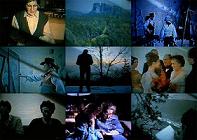 Stephan Dillemuth – Selected Films
Stephan Dillemuth – Selected Films
LUX 28, 28 Shacklewell Lane, Dalston, London E8
Exhibition: 18 – 28 September 2008. Opening hours: 12 - 6, Wednesday - Saturday
Free entry
A rare opportunity to see the recent films of Munich-based artist Stephan Dillemuth presented for the first time with English subtitles. Curated by Anja Kirschner.
Stephan Dillemuth is an artist who sees art as a tool for artistic research and critical reflection on the circumstances of contemporary life. His inquiry into recent changes in the idea of the public sphere takes place against the backdrop of our globalised, localised and fragmented publics. Considering the impact of ‘lifestyle’ as a new ideology of self-fulfilment and liberation, Stephan Dillemuth has investigated the German Lebensreform movements at the turn of the 19th to the 20th century.
Colliding performance footage, TV documentary, archive material and pirated costume drama, Dillemuth's shrewd and often darkly humorous films evince the seriousness of his research and the deftness with which he handles historical material. He avoids didactic explanations or direct comparisons with the present, his work settles in the gap between a contemporary and an historical reading.
Opening event: Thursday 18 September 7pm
Screening of Lichtmenschen im Sumpf der Sonne – Studien zur Lebensreform (2002) (Sunpeople in the Slush of the Light - Studies on the Reform of Life) followed by Q&A with Stephan Dillemuth. ADMISSION FREE To book a place email [email protected]
Lichtmenschen im Sumpf der Sonne – Studien zur Lebensreform
'In Germany, around the turn of the century, a number of groups were formed that can be subsumed under the term 'Lebensreform' (Life Reform). These part utopian, revolutionary, reactionary and reformist approaches characterised the most varied attempts to break free from the Empire of the day: the nationalistic, capitalistic and monolithic Wilhelminian Reich. In view of the development of 'multitudes' of parallel conceptions of life, the Life Reform movements were certainly predecessors of today's 'escapist' constructions of identity, formed via lifestyle conceptions. At the time, some of these approaches lent a sense of 'metaphysical depth' to the arising National Socialism. Other groups were, on the contrary, persecuted by the society of the Third Reich, and incorporated or forced into line, which again produced another monolithic homogeneity.''The video that Stephan Dillemuth attempted to make about these matters was bound to fail in the face of their very complexity. Instead of presenting a refined and finished product, he confronts us with the assembled rubble of his investigation... a performance?'
Double bill screening: Saturday 20 September 4pm
Screening of Elbsandsteingebirge 1789-1848 (DE, 1994, 54mins) and Gesetzt nämlich, dies wäre wahr, wäre es damit auch schon wünschenswert? (DE, 1998, 62mins) (Assuming then, this would be true, would that make it desirable also? - A Video about Richard Wagner and his Circle) followed by Q&A with Stephan Dillemuth. ADMISSION FREE To book a place email [email protected]
Elbsandsteingebirge 1789-184
The bizarre landscape of the Elbsandstein mountains south of Dresden, served as the repository for the motives of nearly all German Romantics. Their paintings have shaped our romantic view of the time between the French Revolution and the March Revolution in Germany. In a journey through images, movies and texts, and a trip in the Elbsandstein mountains themselves we see ourselves confronted with our own projections: Was the Romantic political? Or were the politics romantic?
Gesetzt nämlich, dies wäre wahr, wäre es damit auch schon wünschenswert?”
Assuming then, this would be true, would that make it desirable also? - A Video about Richard Wagner and his Circle'Richard Wagner was a despot, anti-Semite and racist. Despite these warnings Stephan Dillemuth attempts to find Rheingold in the sediment of a bygone century. Instead the failed revolutionary Wagner introduces him to a nationalistic culture and the the musty climate of the Wilhelminian era.